Displaying 81-90 of 892 results
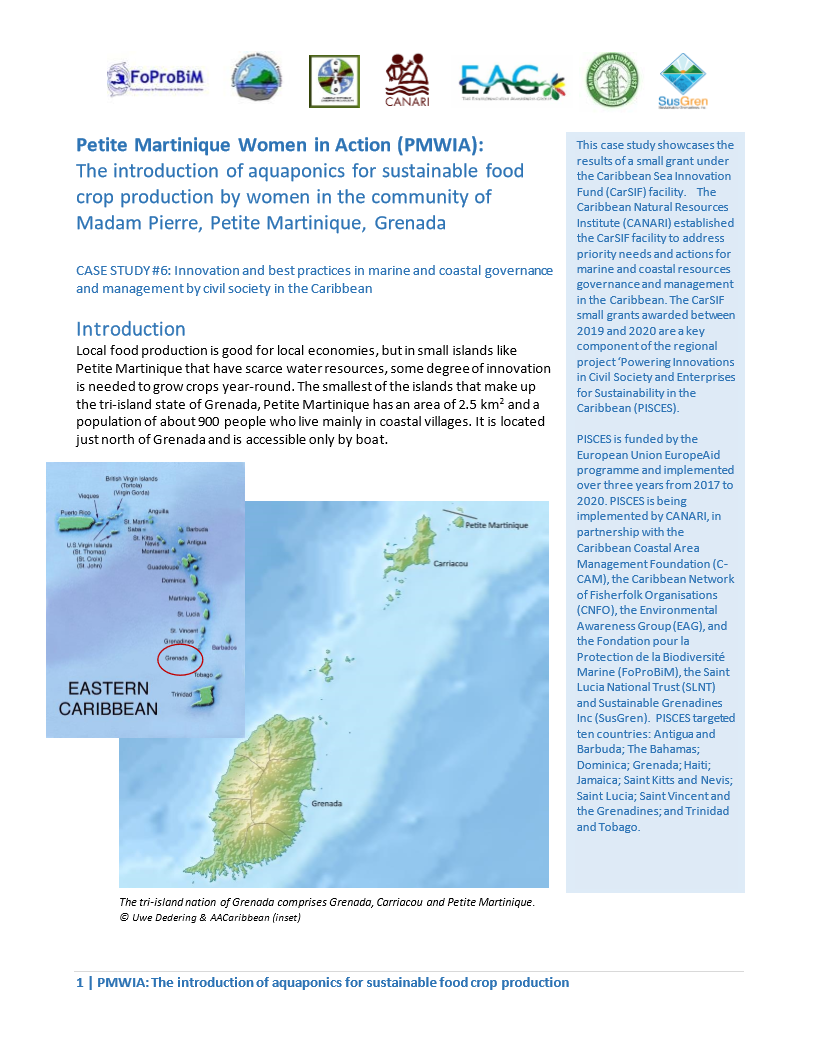
Case study on introduction of aquaponics for sustainable food crop production: Petite Martinique Women in Action (PMWIA)
Local food production is good for local economies, but in small islands like Petite Martinique that have scarce water resources, some degree of innovation is needed to grow crops year-round. The smallest of the islands that make up the tri-island state of Grenada, Petite Martinique has an area of 2.5 km2 and a population of about 900 people who live mainly in coastal villages. It is located just north of Grenada and is accessible only by boat. One group that has been taking steps to increase the availability of fresh food is Petite Martinique Women in Action (PMWIA). Operating out of the community of Madam Pierre since 2016, PMWIA is a local civil society organisation that aims to empower women and youth on the island through gender balance initiatives and livelihood creation geared at sustainable economic development. PMWIA produces produce vegetables commercially using a greenhouse and aquaponics system powered by solar energy. The PMWIA case study was developed under the regional project ‘Powering Innovations in Civil Society and Enterprises for Sustainability in the Caribbean’ (PISCES), which was funded by the European Union EuropeAid programme and implemented by the Caribbean Natural Resources Institute (CANARI) from 2017 to 2021.
 3
3


 Report issue
Report issue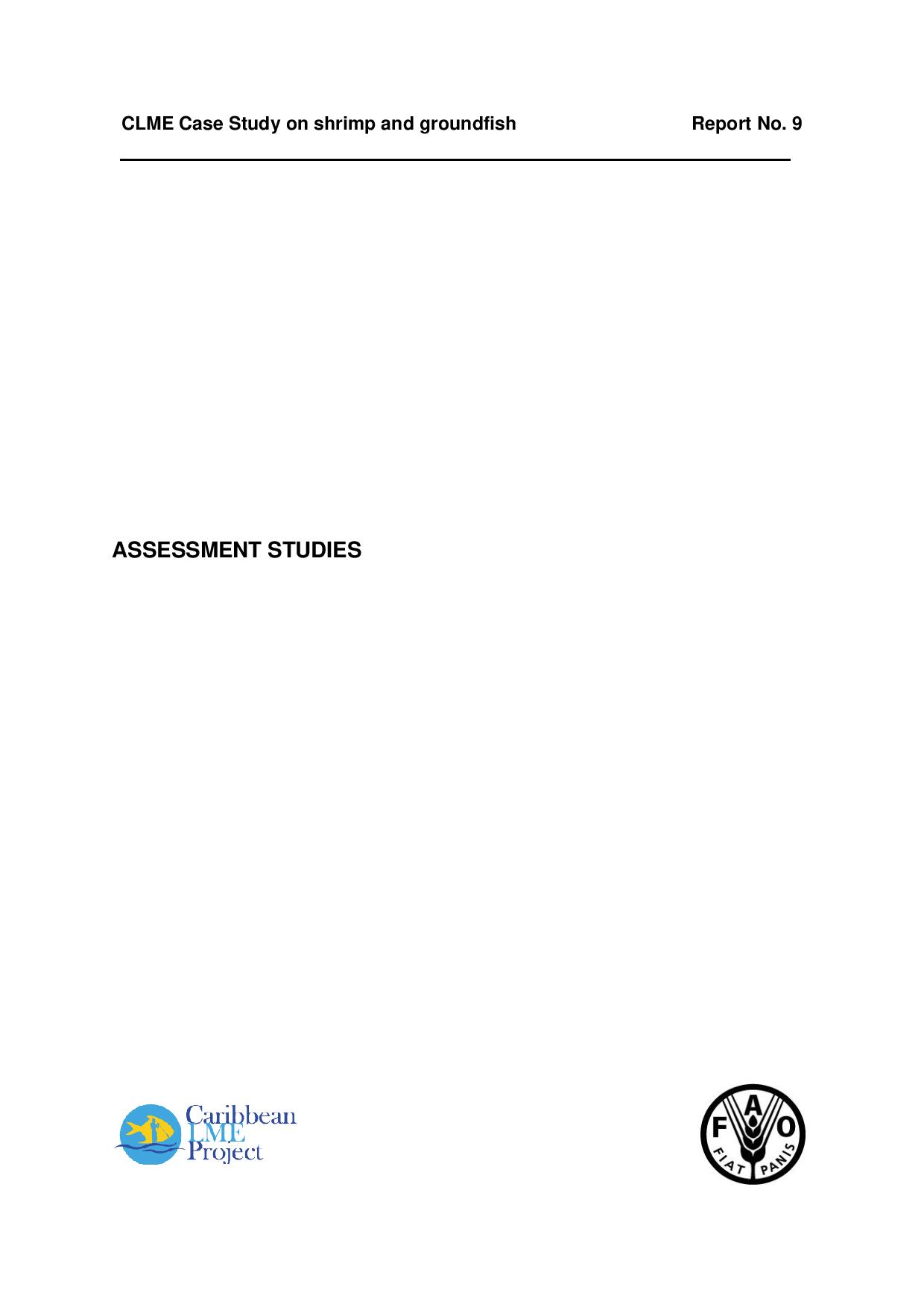
Case Study On Shared Stocks Of The Shrimp And Ground Fish Fishery Of The Guianas -Brazil Shelf Assessment Studies Report.No.9
The background assessment studies that were produced in support of the case study on the Shared Stocks of the Shrimp and Groundfish Fishery of the Guianas-Brazil Shelf were meant to compile the most recent information on the status of the main commercial species and on the profitability of the fisheries these species sustain.
 4
4


 Report issue
Report issue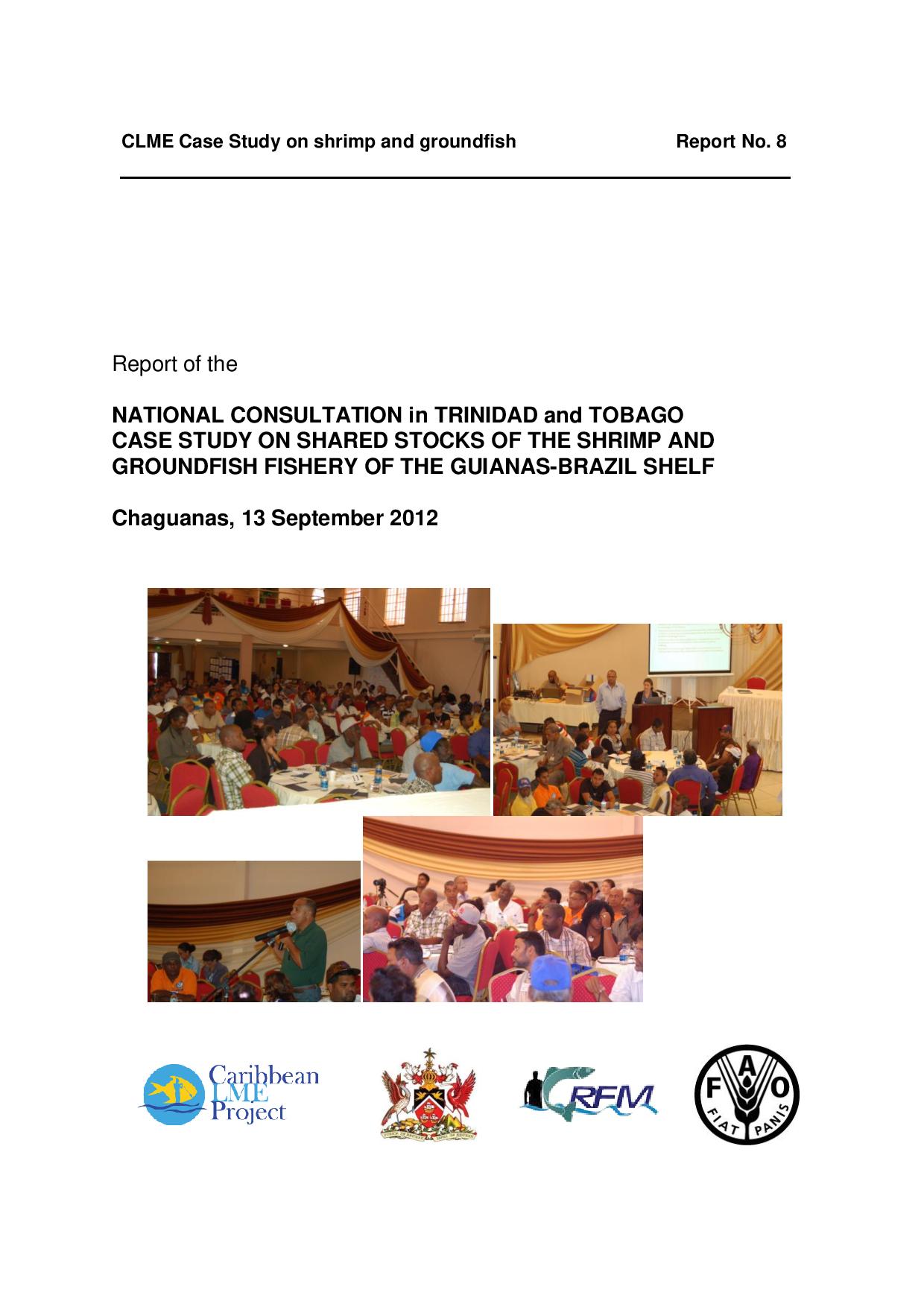
Case Study On Shared Stocks Of The Shrimp And Groundfish Fishery Of The Guianas – Brazil Shelf Report of the National Consultation in Trinidad and Tobago,Chaguanas,13 September 2012 Report No. 8
The purpose of the case study of the Shared Stocks of the Shrimp and Groundfish Fishery of the Guianas-Brazil Shelf was to fill knowledge gaps, contribute to the final CLME Transboundary Diagnostic Analysis and to the Strategic Action Programme (SAP), with priority actions to be undertaken to ensure the sustainability of the shrimp and groundfish fisheries. Another objective was to mainstream the Ecosystem Approach to Fisheries (EAF) in the management of shrimp and groundfish fisheries.
 3
3


 Report issue
Report issue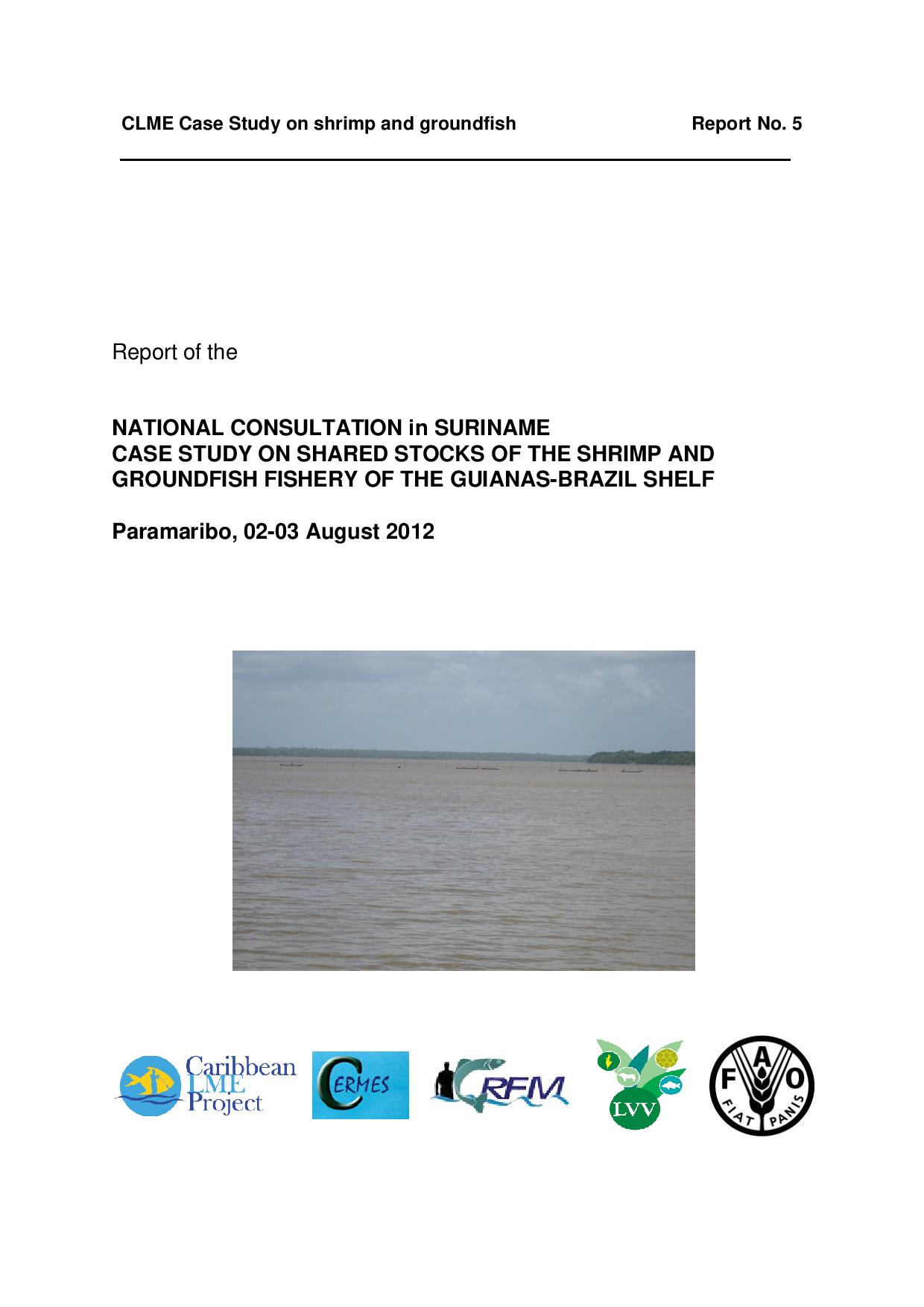
Case Study On Shared Stocks Of The Shrimp And Groundfish Fishery Of The Guianas – Brazil Shelf, Report of the National Consultation in Suriname, Paramaribo, 02 -03 August 2012 Report No.5
This is the report of the national consultation organized by the Ministry of Agriculture, Animal Husbandry and Fisheries of Suriname, in collaboration with FAO and the Caribbean Regional Fisheries Mechanism (CRFM), held in Paramaribo, Suriname on 2 and 3 August 2012. The consultation was organized as part of the Case study of the shared stocks of the shrimp and groundfish fishery of the Guianas-Brazil Shelf of the Caribbean Large Marine Ecosystem Project. The meeting was attended by representatives of the fisheries administration, fishing processing companies, artisanal and industrial fisherfolk, NGOs, Universities and research institutes, different Ministries, CRFM, and FAO.
 3
3


 Report issue
Report issue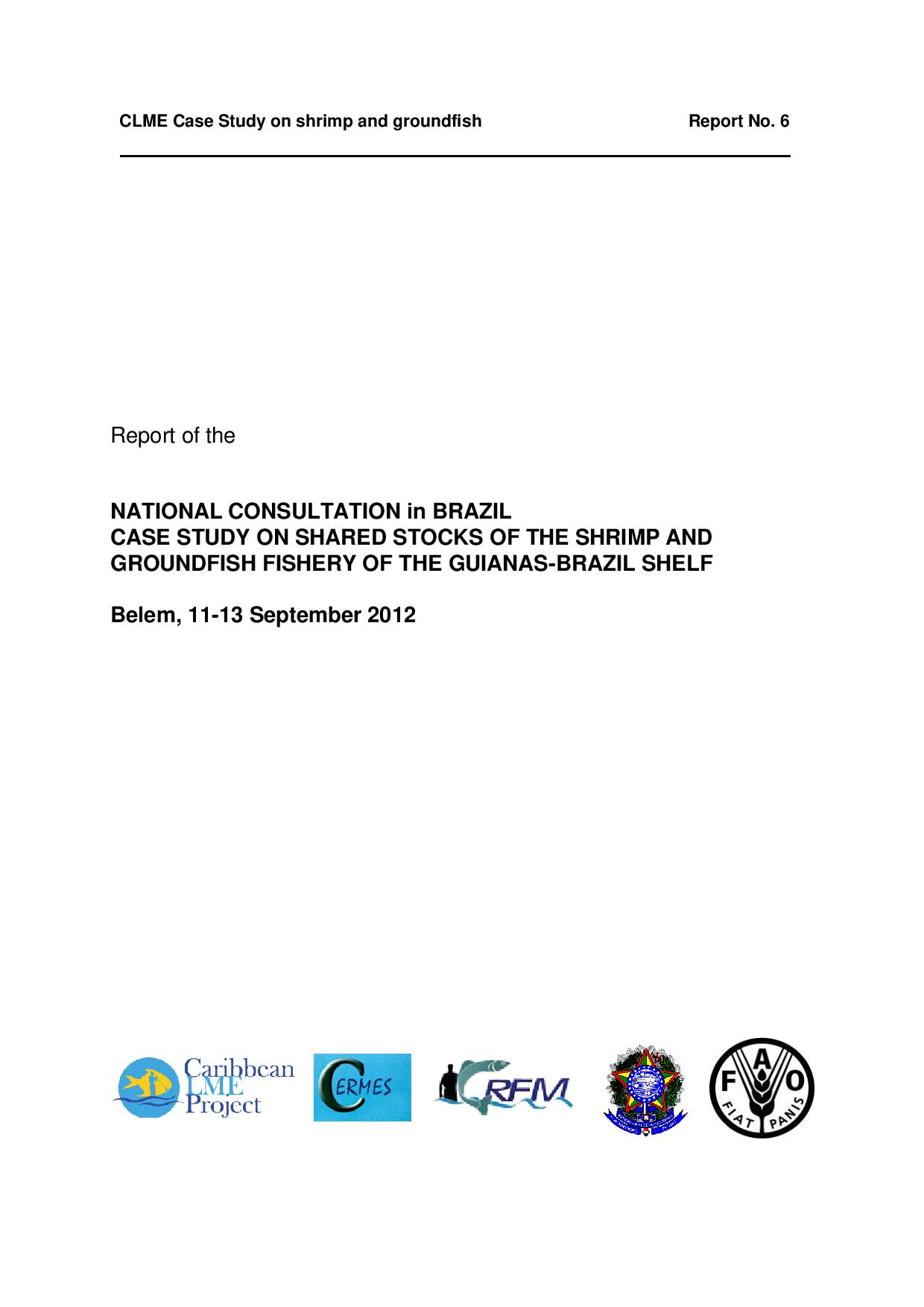
Case Study On Shared Stocks Of The Shrimp And Groundfish Fishery Of The Guianas -Brazil Shelf – Report of the National Consultation in Brazil, Belem, 11-13 September 2012 Report. No.6
This is the report of the national consultation organized by the Ministry of Fisheries and Aquaculture of Brazil in collaboration with FAO and the Caribbean Regional Fisheries Mechanism (CRFM), held in Belem, Brazil, from 11 to 13 September 2012. The consultation was organized as part of the Case study on shared stocks of the shrimp and groundfish fishery of the Guianas-Brazil Shelf of the Caribbean Large Marine Ecosystem Project. The meeting was attended by representatives of key stakeholders in the shrimp and groundfish fisheries of northern Brazil, from the States of Amapa, Para and Maranhão, coming from Ministries, fisherfolk organizations, academic institutions, NGOs and FAO.
 3
3


 Report issue
Report issue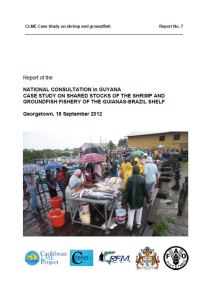
Case Study on Shrimp and Groundfish Fishery: Guyana
This is the report of the national consultation organized by the Ministry of Agriculture of Guyana, in collaboration with FAO and the Caribbean Regional Fisheries Mechanism (CRFM), held in Georgetown, Guyana, on 18 September 2012. The report contains a summary of the discussions held during the national consultation, the results of a scoping exercise that was carried out by the participants, the baseline report that was discussed and agreed upon by the stakeholders, as well as the results of the preliminary meetings that were held prior to the national consultation.
 14
14
 1
1

 Report issue
Report issue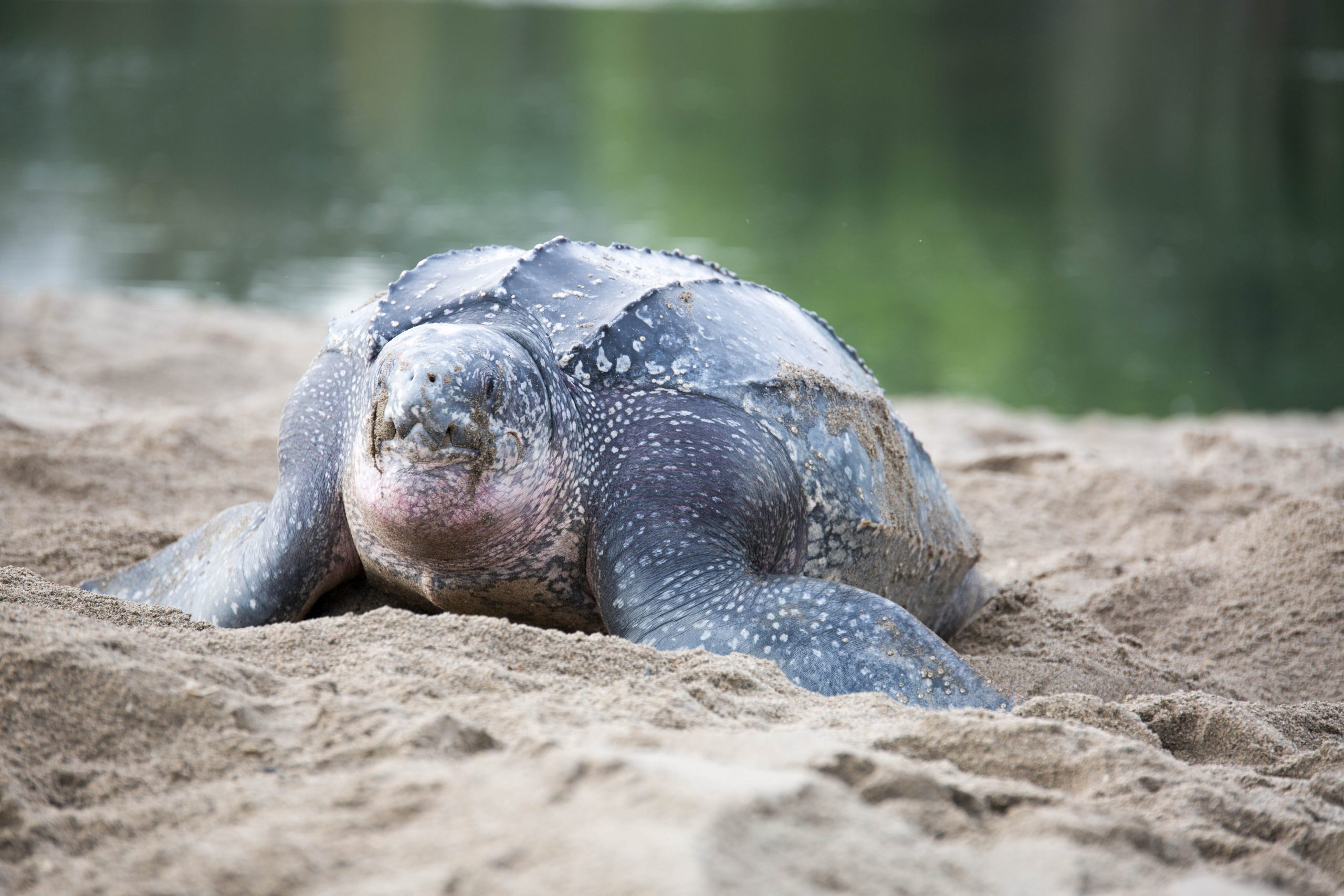
Case study on the Grande Riviere Nature Tour Guides Association, a local green‐blue enterprise in Trinidad and Tobago.
This case study reflects findings of a process using CANARI’s Local Green‐Blue Enterprise Radar1. This is a tool to help local community small and micro‐enterprises assess how they are delivering ‘triple‐bottom line’ benefits (economic, environmental and social) and good governance, and what are possible areas for improvement. A focus group session is facilitated with members of the enterprise and they are asked to assess how they think the business is doing based on a set of indicators. Each indicator is discussed, and members agree on a ranking for each. The ranking for each indicator is placed on a spider diagram, which visually represents a snapshot of how the enterprise is delivering benefits. The rich discussion helps members of the enterprise work together to assess how they are doing and areas where they want to grow.
 3
3


 Report issue
Report issue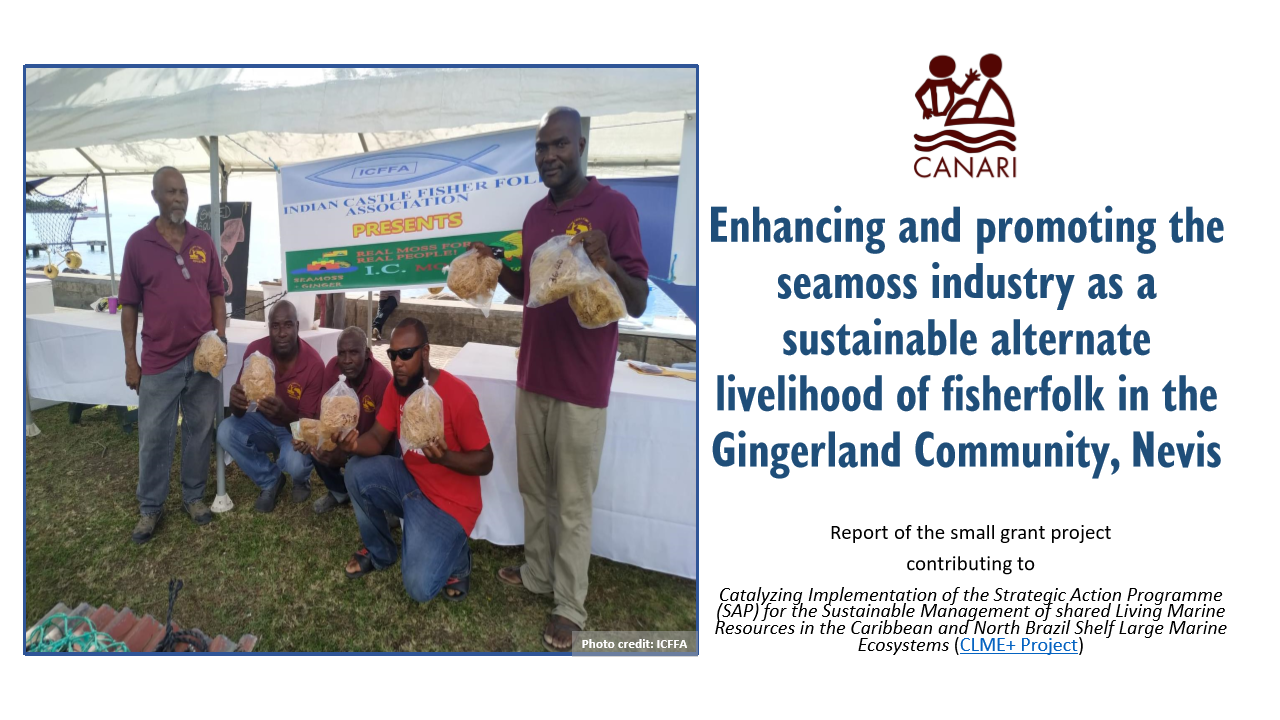
Case study on the Indian Castle Fisherfolk Association – Enhancing and promoting the seamoss industry as a sustainable alternative livelihood of fisherfolk in the Gingerland Community, Nevis
The Indian Castle Fisherfolk Association (ICFFA) on the island of Nevis in St Kitts and Nevis was able to expand its seamoss farm – thereby providing a greater source of sustainable income to fisherfolk in the Gingerland community. thanks to a small grant of US$17,650 in April 2019. The Caribbean Natural Resources Institute provided support to the ICFFA via a small grant under the C-SAP project, and mentoring provided under the regional PISCES project. ICFFA’s increased seamoss production was key to helping mitigate the financial impacts of the reduced catch presently experienced by fisherfolk in the Gingerland community due to climate change and other factors. LEARN MORE about ICFFA’s journey in the case study, "Enhancing and promoting the seamoss industry as a sustainable alternate livelihood of fisherfolk in the Gingerland Community, Nevis".



 Report issue
Report issue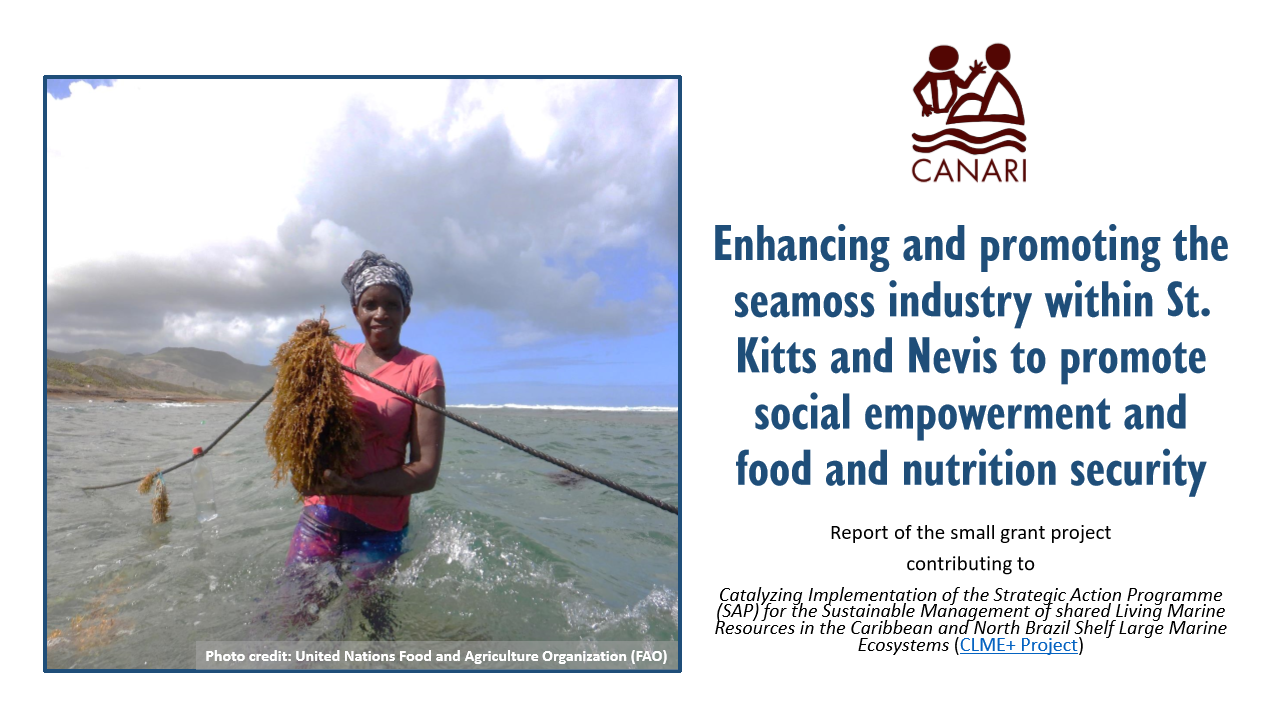
Case study on the Liamuiga Seamoss Group – Enhancing and promoting the seamoss industry in St. Kitts and Nevis to promote social empowerment and food and nutrition security
The Liamuiga Sea Moss Group (LSG) in Conaree Village, St. Kitts, was formed in 2017 by a group of agro-processors and fisherfolk involved in the production of seamoss products from seamoss grown in the wild. Seamoss farming was identified as great alternative livelihood to fishing, as a source of sustainable income in fishing communities. The LSG used a small grant of US$35,170, provided in March 2019 by the Caribbean Natural Resources Institute (CANARI) under the C-SAP project, to enhance and promote their small business, including expanding their seamoss plots and setting up their own small processing facility. CANARI also provided mentoring support to the LSG under the regional PISCES project. LEARN MORE about LSG’s journey in the case study, "Enhancing and promoting the seamoss industry within St. Kitts and Nevis to promote social empowerment and food and nutrition security".
 3
3


 Report issue
Report issue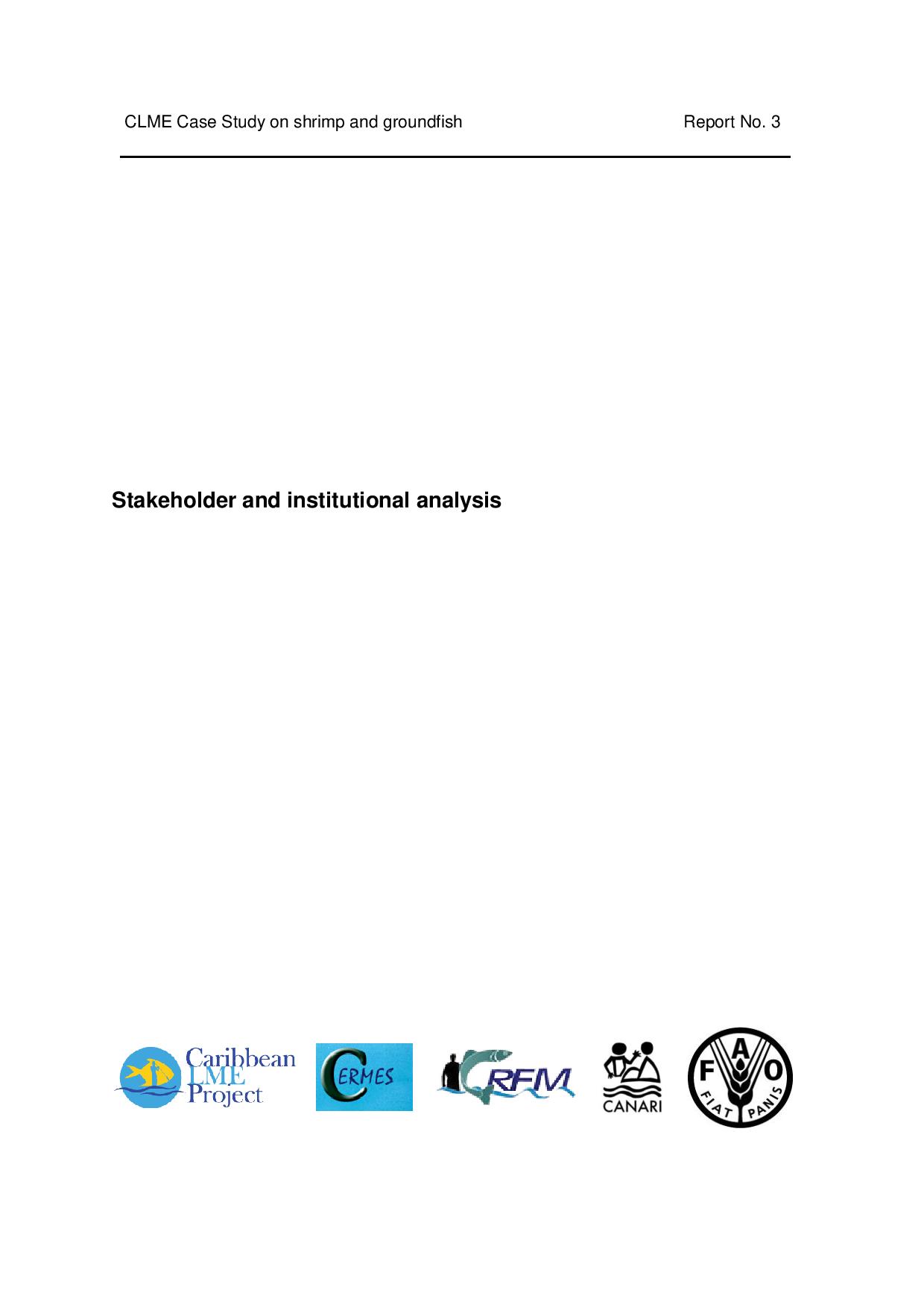
Case Study On The Shared Stocks Of The Shrimp And Ground Fishery Of The Guianias – Brazil Shelf Stakeholder and Institutional Analysis CLME Case Study on shrimp and groundfish.Report No. 3
FAO implemented a “Case Study on Shared Stocks of the Shrimp and Groundfish Fishery of the Guianas-Brazil Shelf” (UNGF/INT/001/OPS) between July 2011 and February 2013, with six participating countries (Brazil, French Guiana (EU/France), Guyana, Suriname, Trinidad and Tobago and Venezuela). The purpose of the case study on Shared Stocks of the Shrimp and Groundfish Fishery of the Guianas-Brazil Shelf was to fill knowledge gaps, contribute to the final CLMETransboundary DiagnosticAnalysis and to the Strategic Action Programme (SAP), with priority actions to be undertaken to ensure the sustainability of the shrimp and groundfish fisheries.
 3
3


 Report issue
Report issue

